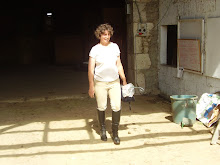Saturday, September 12, 2009
A Stove that Runs on Straw instead of Coal
Wednesday, September 9, 2009
Beach Soccer's World Champion
One day Eric Cantona saw Léa playing beach soccer. She was playing like a champion. He asked her to join his team. Léa said no because she doesn't like men with beards.
Another day Raymond Domenech saw Léa playing beach soccer. He asked her to help his team qualify for the European Cup. Léa said no because she doesn't like Raymond Domenech.
Then one day Zac Efron saw Léa playing beach soccer and he invited her to a Japanese restaurant. They ate thirty-seven sushi and drank green tea. Zac asked Léa to join his team. Of course Léa said yes. Now Zac's team has won the Beach Soccer World Cup.
Monday, September 7, 2009
Audrey's Vacation in Spain
 Audrey went to Spain in a red helicopter with her boyfriend, Zac Efron. In Madrid they had afternoon tea with King Juan Carlos. Then they went to Barcelona to see the beautiful monuments. They climbed to the top of the Sacra Familia and they could see the sea and the mountains. Zac wanted to buy the Sacra Familia for 5,086,021,070 dollars and 60 cents. But he only had $5,086,021,060.60. So he sold his Rolex to Thierry Henry for ten dollars. Thierry Henry was very happy. But Zac changed his mind. He didn't buy the cathedral because it isn't finished. He is going to buy it in 2030, when it's finished.
Audrey went to Spain in a red helicopter with her boyfriend, Zac Efron. In Madrid they had afternoon tea with King Juan Carlos. Then they went to Barcelona to see the beautiful monuments. They climbed to the top of the Sacra Familia and they could see the sea and the mountains. Zac wanted to buy the Sacra Familia for 5,086,021,070 dollars and 60 cents. But he only had $5,086,021,060.60. So he sold his Rolex to Thierry Henry for ten dollars. Thierry Henry was very happy. But Zac changed his mind. He didn't buy the cathedral because it isn't finished. He is going to buy it in 2030, when it's finished.Sunday, September 6, 2009
Something to think about ...

| Washington, DC Metro Station on a cold January morning in 2007. The man with a violin played six Bach pieces for about 45 minutes. During that time, approx. 2 thousand people went through the station, most of them on their way to work. After 3 minutes, a middle- aged man noticed there was a musician playing. He slowed his pace and stopped for a few seconds and then hurried to meet his schedule. 4 minutes later: The violinist received his first dollar: a woman threw the money in the hat and, without stopping, continued to walk. 6 minutes: A young man leaned against the wall to listen to him, then looked at his watch and started to walk again. |
10 minutes: A 3-year old boy stopped, but his mother tugged him along hurriedly. The kid stopped to look at the violinist again, but the mother pushed hard and the child continued to walk, turning his head all the time. This action was repeated by several other children. Every parent, without exception, forced their children to move on quickly.
45 minutes: The musician played continuously. Only 6 people stopped and listened for a short while. About 20 gave money but continued to walk at their normal pace. The man collected a total of $32.
1 hour: He finished playing and silence took over. No one noticed. No one applauded, nor was there any recognition.
No one knew this, but the violinist was Joshua Bell, one of the greatest musicians in the world. He played one of the most intricate pieces ever written, with a violin worth $3.5 million dollars. Two days before Joshua Bell had sold out a theater in Boston where the seats averaged $100 each.
One possible conclusion reached from this experiment could be this: if we do not have a moment to stop and listen to one of the best musicians in the world, playing some of the finest music ever written, with one of the most beautiful instruments ever made.... how many other things are we missing?
